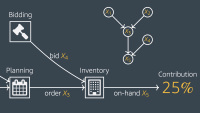When Domenico Giannone decided to study statistics as an undergrad at Sapienza Università di Roma in the early 1990s, he didn’t fully understand what the discipline — the collection, analysis, interpretation, and presentation of data — entailed.
“I was window shopping around the campus and saw something about statistics. I started asking people about it and they told me it involved a lot of math and also some social studies, and I thought, ‘Well, that might work for me,’” he recalled.
Given he is one of the most cited economists of his generation in several different fields of economic study, “might” turned out to be an understatement.
My encounter with statistics probability theory and economics was a revelation. I could not stop diving deeper and deeper.
“I liked that it could provide powerful tools to understand people’s behavior and socio-economic trends and help improve social welfare,” he said. “My encounter with statistics probability theory and economics was a revelation. I could not stop diving deeper and deeper.”
After college, Giannone worked at the Italian anti-money laundering authority and then pursued a PhD in statistics and economics at the Université Libre de Bruxelles (ULB), in Belgium. There his research focused on the econometrics of high-dimensional data.
In an era when people were just beginning to talk about big data, he decided to focus on large dynamic forecasting models. In doing so, he helped develop the theories that have been shaping his research ever since.
Turning a curse into a blessing
“In statistics, there is something called the curse of dimensionality,” Giannone explained. While more data should result in better predictions, it also means more noise, which requires more complex models to sort valuable data from the noise.
“With that complexity, it’s easier to get lost because there is too much statistical uncertainty,” he added.
The goal of his research: turn the curse of dimensionality into a blessing by removing the high variance and uncertainty while extracting the correct signals from the data.
Giannone draws a parallel between making sense of big data through models and learning how to get around in a new city with a map.
“The perfect map would be a 1:1 map, which is also completely impractical,” he noted. “In a sense, handling big data and high dimensional models is trying to understand what is the right scale of the map that allows you to get the information you need without getting lost in details. And there are statistical methods that allow us to essentially handle the trade-off between complexity and uncertainty.”
While pursuing his PhD, he took an interest in nowcasting, a term he borrowed from meteorology which refers to the prediction of the present.
"The very origin of nowcasting"
Official economic indicators like gross domestic product (GDP) are released quarterly — and often revised, meaning officials relying on them to make real-time policy decisions are utilizing incomplete data.
Giannone sought a methodology that could utilize more frequently released data — like exchange rates, stock prices, opinion surveys, and labor market indicators — to provide a more accurate and timelier picture of the economic present.
“I developed a factor model to constantly digest all this massive information that is available every day to predict where we are now — a prediction of the present,” he explained.
Giannone and several collaborators started developing the nowcasting methodology as part of a project for the Board of Governors of the U.S. Federal Reserve System.
The first results were published in a 2005 working paper, “Nowcasting GDP and Inflation: The Real-Time Informational Content of Macroeconomic Data Releases”. The paper “formalizes the process of updating the nowcast and forecast on output and inflation as new releases of data become available.”
“This paper is the very origin of nowcasting,” Giannone explained. “The approach was developed from broader research in which I developed dynamic machine learning methods to distill information from big data in real time.”
This is now a thriving academic field and almost every central bank in the world has developed a nowcasting model for their economy.
Between research and practice
In 2009, after a six-year stretch where he worked as a scientific coordinator for Euro Area Business Cycle Network and an economist for the European Central Bank, his interest in formal research drew him back to academia.
As a professor at Solvay Brussels School of Economics and Management, he taught econometrics at all levels, from undergraduate to PhD.
“I get inspiration from practical problems, this is what drives my research. But I'm also very interested in pure research and treating problems with analytic rigor. So that's why I've always been in between research and practice,” he said.
While teaching, he founded Now-Casting Economics — an online service that provides a short-term forecast for the world’s largest economies in real-time. The company is still active and its main clients are hedge funds and other investment institutions. Giannone is currently a passive shareholder.
In 2014, he moved to the U.S. to work as a research economist at the Federal Reserve Bank of New York, where he founded and led a team focused on macroeconometrics and forecasting. His goal: use time series statistical methods to make predictions and interpretations of macroeconomic trends. Every week, his team would publish an updated assessment of the state of the economy based on new data that had become available, a product that was closely followed by the financial markets and the media.
Giannone notes that central bank research departments are very similar to universities in terms of the rigor expected in economic analyses. He admits, however, that he assumed the same would not hold true for a company like Amazon.
“I always thought about the corporate environment as a place in which you have to give up the rigor because you have to deliver answers fast,” he explained.
A presentation he gave at Amazon changed his mind — and his career path.
Applying his research at Amazon
In 2017, Giannone was invited to give a presentation about nowcasting by a former colleague, George Monokroussos, then an Amazon senior economist. It was there he learned about the interesting forecasting challenges that scientists were tackling at the company — and that his initial assumptions were invalid.
“I saw people working on important practical problems, but without giving up the possibility of diving deep,” he said. “I also realized that the kind of research that I was doing, the kinds of tools that I developed and like to use, had a potentially important role in Amazon. I saw a lot of opportunities.”
The kind of research that I was doing, the kinds of tools that I developed and like to use, had a potentially important role in Amazon. I saw a lot of opportunities.
After the event, he had a conversation with an Amazon HR representative about his experience and interests, and about the general culture of the company. Those conversations eventually led to him joining Amazon as a senior principal economist in the Supply Chain Optimization Technologies (SCOT) organization in November 2019.
Today, Giannone focuses primarily on forecasting and understanding Amazon aggregate demand by developing and deploying interpretable and explainable dynamic machine-learning methods. These forecasts don’t focus on specific product sales, but instead on the total company sales over time.
“This is very similar to my expertise because, as a macroeconomist, I don't predict detailed sectors or specific products but the overall behavior.”
The forecasts Giannone and his colleagues produce are used to make planning decisions at all levels.
“Forecasting is very important to make sure that our customers get what they want in the fastest possible way,” he explained.
These models look at past trends to predict future demand and also use macroeconomic information that examines the state of economy to understand cyclical and secular changes in consumer behavior.
“When COVID arrived, it became clear that understanding macroeconomic trends was more important than ever,” Giannone said.
He says the primary difference between doing research within industry and his previous work environments is that he gets to work with people from diverse backgrounds, including engineers, computer scientists, applied mathematicians, and microeconomists.
“This is something that I always loved because I get inspired by other fields. I had that experience in academia but on limited occasions. Here at Amazon, I experience it every day.”




















